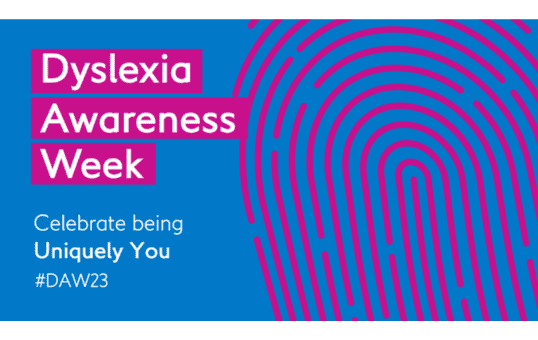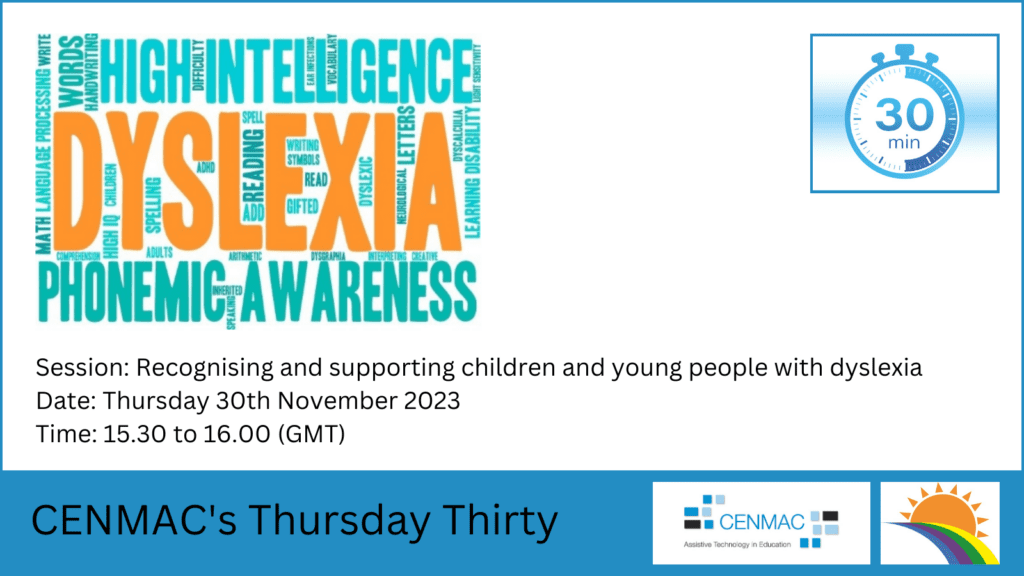Dyslexia Awareness Week – Uniquely You
Dyslexia Awareness Week (2nd to 8th October)
This year the British Dyslexia Association’s theme for Dyslexia Awareness Week is “Uniquely You” as each person with dyslexia experiences it in ways unique to them.
What is Dyslexia?
“Dyslexia is a learning difficulty which primarily affects reading and writing skills. However, it does not only affect these skills. Dyslexia is actually about information processing. Dyslexic people may have difficulty processing and remembering information they see and hear, which can affect learning and the acquisition of literacy skills. Dyslexia can also impact on other areas such as organisational skills. It is important to remember that there are positives to thinking differently. Many dyslexic people show strengths in areas such as reasoning and in visual and creative fields.” (BDA, 2023)
Dyslexia affects people in many ways
Dyslexia is more than just a difficulty with reading and writing as many may think. Therefore, a lot of children and young persons (YPs) “slip through the net” and do not get diagnosed or get diagnosed with other conditions instead. Dyslexia affects people in many ways; as Sir Rose (2009) said, “Dyslexia occurs across the range of intellectual abilities. It is best thought of as a continuum, not a distinct category, and there are no clear cut-off points. Co-occurring difficulties may be seen in aspects of language, motor co-ordination, mental calculation, concentration and personal organisation, but these are not, by themselves, markers of dyslexia.” (Rose Report, p.10)
The importance of Dyslexia awareness
Spreading awareness about dyslexia is vital in understanding what it is and supporting children and YPs throughout their life. The Dyslexia Awareness Week theme for this year will celebrate individuals with dyslexia from different backgrounds with unique aspirations and experiences. Dyslexia looks very different from one individual to another, and it is very important for everyone to know that there is no “one size fits all” approach to further support them. By spreading awareness, schools and carers will help children and YPs to be identified and eventually get a diagnosis. Many children and YPs said to me that getting a diagnosis helped them to “find the missing piece of the puzzle” they have been searching for over the years; now they understand their struggles are related to dyslexia. This helps them to overcome different challenges and makes them focus more on their strengths instead.
It is great to make individuals with dyslexia feel valued and celebrated each year; talk about their achievements, encourage their strengths, help them achieve their potential, and ultimately boost their confidence.
Share on social media using: #DAW23 #DAW2023 #Dyslexia #UniquelyYou #DyslexiaAwarenessWeek2023
> Access more on Dyslexia Awareness Week
Blog author: Abeer Essa, CENMAC’s Dyslexia Assessor and Advisory Speech and Language Therapist
CENMAC’s Thursday Thirty – Online Information Session
Recognising and supporting children and young people with Dyslexia
Date: Thursday 30 November
Time: 15.30 to 16.00 (GMT)
Venue: Online via Microsoft Teams
Join Abeer Essa CENMAC’s Dyslexia Assessor and Advisory Speech and Language Therapist for this online session about Dyslexia. Abeer will talk about how to recognise if a child or young person might have dyslexia, and how it can affect their learning. She will also briefly talk about testing for dyslexia nd how a child with dyslexia can be supported in the classroom with the use of assistive technology.





